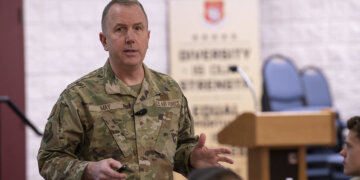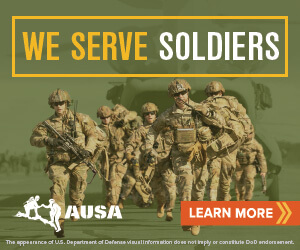Sheri Carter has never had a fear of knocking on doors. The 51-year-old grandmother and Missourian has worn many hats in her lifetime, from her current job as a Walmart compliance manager to paralegal to EMT to firefighter, and recently added farmer to that list, but one thing remains constant — she will not be deterred from her mission.
It also explains why in 2008, as a 37-year-old single mother, Carter pursued a longstanding dream and joined the Army Reserve.
“It was something I needed at that time in my life,” she said. “I went to speak to a recruiter and we talked about women in service and what we could and couldn’t do, and I told him I don’t really want to work on a base — I had no desire to go do all of this and just sit behind a desk. I wanted a full opportunity to serve my country and the ultimate experience. He told me civil affairs was the job I wanted.”
By the time she graduated from AIT, Carter was already on the battle roster for a deployment to Djibouti. But when she arrived in country, she discovered a lack of mission and guidance — she quickly had to figure out how to employ her skillset. Once again, she went knocking on doors until she landed an opportunity to work in public affairs, which meant traveling by herself across nine countries to cover missions, and then writing about them for the Army.
“I was very proud of myself, one for representing myself so well, and two, for having the courage to do it,” she said. “Not once did I back down from any mission I was given. I feel like I represented females well, especially at a time when we weren’t allowed to have jobs outside the wire. It was my life’s biggest challenge.”
After serving eight years, Carter got out of the Army and decided to pursue another dream of hers — farming.
“Mostly I wanted a lot of land around me so I wouldn’t see people,” she said. “I wanted a way to work myself out of the corporate world and into self-employment and be in a place where I feel most comfortable, and that’s in the land and the country.”
“I want my space, and I want to feel safe in my space,” she added.
She heard about an organization called Armed to Farm and took a course on how to acquire land. Then she bought 21 acres of her own.
“You learn a little bit about a lot in Armed to Farm, and I took the things that resonated with me and took it upon myself to learn more by signing up for more courses,” she said. “Right now, I’m doing a bee keeping class.”
Carter currently has two hives — a Slovenian hive and a standard one. In addition to bees, her property houses 20 chickens, five guinea fowl, three cats and at least three dogs at any one time. She has fostered more than 50 dogs since 2020. A cow is also likely in the near future.
But her latest agricultural endeavor is something called a hugelkultur, which she described as a big self-sustaining mound of layered compostable materials that she hopes will make gardening easier without readily-available water.
Carter would eventually like to expand into the agro-tourism business and use her property for everything from growing flowers for U-Pick operations to providing courses on foraging and medicinal plants.
“My ultimate goal is to be able to employ veterans and have an outlet for veterans where we can come and take courses, where I can offer opportunities for them,” she said.
But Carter’s service-related injuries have hampered her efforts to achieve her goals. She has very little hand strength, and has arthritis, fibromyalgia, and chronic fatigue syndrome. She also has PTSD, anxiety and depression.
“I never know how much energy I’m going to have in a day to make it happen,” she said. “I’ve really had to ask for help with finding ideas for gardening while suffering from my illnesses. I’ve always had to find ways to do it all.”
After learning about the program during a hunting trip with other female veterans, Carter applied for a Warrior’s Wish through Hope For The Warriors with the hopes of receiving a Utility Terrain Vehicle (UTV) to make life and work on her property more manageable. She was elated when she was awarded a brand-new Massimo 850-5.
From moving logs out of the path on her property to going out at night to check for animals in distress, the UTV has been an invaluable asset. And while her own passion for farming and gardening might have motivated her, she made her request with others in mind.
Carter specifically asked for the five-passenger, side-by-side model because it has a bed that accommodates a mechanized wheelchair, which has been instrumental in helping a friend join the monthly bonfires Carter hosts for fellow women to talk openly on her property in a safe and welcoming environment.
It’s during these gatherings that Carter feels like she’s doing the most to give back to the community by providing a space for self-care and mental health.
“I’ve wanted to bring females together. Female veterans, police, fire, EMS . . . and it’s expanded to nurses and social workers. Any females who have been in service,” she said.
While Carter has spent her life knocking on doors for opportunities, she never turns away those who come knocking on hers.
“I just want women to come and enjoy and not feel unsafe,” she said. “We need each other.”
Replica Nautilus 5719/10G-010 Patek Philippe
Resources for veterans who farm:
Armed to Farm – Supports veterans with hands-on and classroom learning opportunities for sustainable agriculture. Farmer veterans learn how to run a successful business and market their products, how to access USDA resources, set business goals, and develop meaningful mentorships with seasoned farmers.
Ranchin’ Vets – Assists in the reintegration of veterans from military to civilian life through a variety of programs offered within the ranching and agricultural industry.
Veterans to Farmers – Helps veterans assimilate effectively, productively and permanently into private citizenry by training them in agriculture that leads to urban homesteading and/or business ownership.
Military Veterans Agricultural Liaison (MVAL) – helps veterans explore ways to launch successful careers in agriculture.
Farmer Veteran Coalition – Cultivates a new generation of farmers and food leaders, and develop viable employment and meaningful careers through the collaboration of the farming and military communities.
Hives For Heroes – Utilizes a national network of beekeepers to provide connection, purpose, and healthy relationships, through access, resources, and funding for active duty, veterans, and first responders.
Heroes to Hives – A unique program through Michigan State University Extension that seeks to address financial and personal wellness of veterans through professional training and community development centered around beekeeping.
Read comments








































